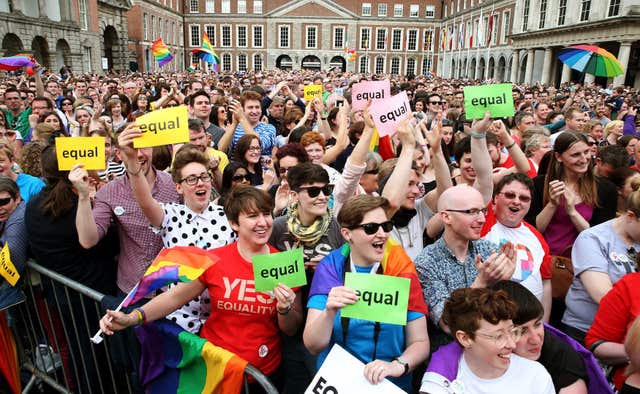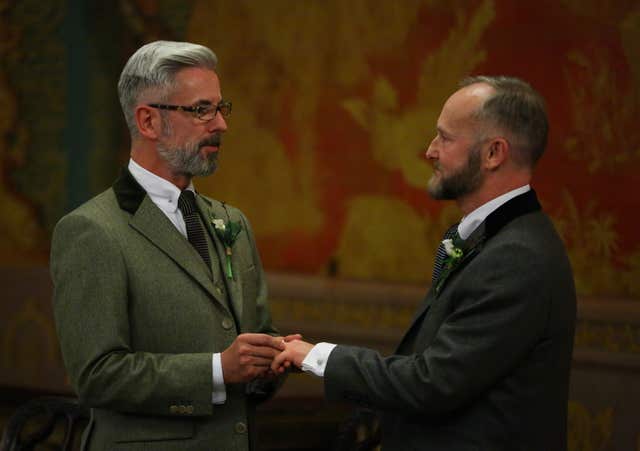
One of the UK’s first gay married men has called for LGBT+ rights to be prioritised in the Government’s foreign policy, as legalised same-sex marriage marks its 10-year anniversary on Friday.
Peter McGraith, 59, married partner David Cabreza at Islington Town Hall in London just after midnight on March 29 2014, when the legislation in England and Wales passed into law.
The couple, who first met in 1997, now live in north London with their two adopted sons.
Several other European countries have also since made the act legal, including the Republic of Ireland in 2015, Northern Ireland in 2020 and Greece last month.
Mr McGraith said LGBT+ discussions in political settings needed to be as prominent as those focused on other human rights movements.
Speaking to the PA news agency, he said: “I think I really want to use this anniversary very much to put a message to our politicians.
“The UK has promoted women’s and girls’ rights through all its dealings, it’s baked into all sorts of work that we do in disaster relief, international treaties, bilateral and multilateral working.
“Those rights are right there, and LGBT rights should be too.”

Mr McGraith said it seemed like LGBT+ issues were “further down” the political agenda, adding: “I’m not saying they don’t get mentioned – our embassies abroad try to do some work locally, with the LGBT groups on the ground in the countries that they work in. But that all needs to ramp up a lot.”
Same-sex marriages have increased year-on-year since being legalised, with the estimated number of people in such marriages at 167,000 in 2022, up from 26,000 in 2015.
Of these, males accounted for around six in 10 (61.2%), while females accounted for around four in 10 (38.8%).
Mr McGraith said the legalisation was a huge moment that was years in the making but needed to be put in context, as other countries were still persecuting homosexuality and he had always felt part of a global community.
He said: “It just felt like that moment in the media spotlight would probably confer on whoever married first the opportunity or responsibility to speak on LGBT rights forevermore.
“I don’t like the idea that the story should be that these are people who were handing back their gay cards and saying ‘I’m alright Jack’, because actually what we were saying is, yeah, we might have some cause for a party here, but I really don’t want to be seen to be self-congratulatory here, and I certainly wasn’t willing to be photographed chinking champagne glasses and looking privileged.”

Andrew Wale, another gay man who got married just after midnight 10 years ago, said LGBT+ equality had improved since but that he was concerned things were “beginning to retreat a little bit”.
Mr Wale, 59, and Neil Allard, 58, wed at the Royal Pavilion in Brighton on March 29 2014 and had put off having a civil partnership as they “didn’t really consider it to be full equality”.
The pair, who now live near Malaga in Spain, said the main reason they decided to get married was for “legal security”, such as being next of kin.
Mr Wale said he wanted to make sure the wedding “didn’t just turn into a celebration of romance” as it “is more than that”.
He said: “We were living in Brighton and we were very privileged to be living in England and Brighton, as far as being gay was concerned, we were relatively safe – although friends of ours were beaten up in the street in Brighton a couple of months before we were married because they were holding hands.
“So I hope equal marriage has helped that situation.
“But certainly, there’s a sense that things are turning back a little bit, beginning to retreat a little bit, I think there’s a number of causes, one of them being events like Brexit, one of them being extreme differing opinions about trans people. So there’s lots of things that continue to be problematic.”
Mr Wale added: “Nothing is particularly solved, but I think things have improved certainly in 10 years.”
Jesse Sperling, interim executive director of LGBT+ rights charity Kaleidoscope Trust, said: “As we celebrate 10 years of same-sex marriage being legal in England and Wales, we still have a long way to go in the global fight for equality.
“As an organisation that works to promote LGBTI+ rights around the world, we see first-hand the significant role that the UK government has played in promoting LGBTI+ rights globally. But we agree that there is much more that could be done to ensure that upholding the human rights of LGBTI+ people is embedded in all foreign policy.
“We are calling for the next UK government to enact the strategic priorities outlined in our policy manifesto, including addressing violence and discrimination against LGBTI+ people, allocating 0.3% of international aid spend specifically to fighting for LGBTI+ rights and strengthening the role of the UK Special Envoy on LGBT+ Rights.”


Comments: Our rules
We want our comments to be a lively and valuable part of our community - a place where readers can debate and engage with the most important local issues. The ability to comment on our stories is a privilege, not a right, however, and that privilege may be withdrawn if it is abused or misused.
Please report any comments that break our rules.
Read the rules hereLast Updated:
Report this comment Cancel